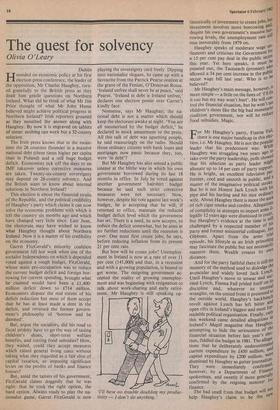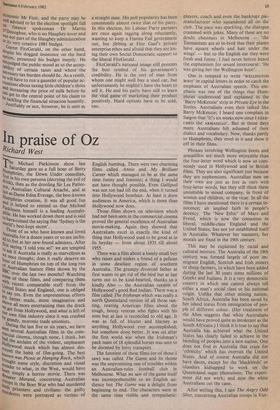The quest for solvency
Olivia O'Leary
Dublin
Hounded on economic policy at his first election press conference, the leader of the opposition, Mr Charles Haughey, turn- ed gratefully to the British press as they dealt him gentle questions on Northern Ireland. What did he think of what Mr Jim Prior thought of what Mr John Hume believed might achieve political progress in Northern Ireland? Irish reporters groaned as they mouthed the answer along with Haughey.' By now it is engraved on tablets of stone: nothing can work but a 32-county solution.
The Irish press knows that in the mean- time the 26 counties flounder in a massive national debt (three times higher per capita than in Poland) and a still huge budget deficit. Economists tick off the days to an IMF takeover unless corrective measures are taken. Twenty-six-county sovereignty may depend on 26-county solvency. And the British want to know about internal solutions in Northern Ireland?
This election is about the financial straits of the Republic, and the political credibility of Haughey's party which claims it can now solve the economic problems with which it left the country six months ago and which have changed very little since. Last June, the electorate may have wished to know what Haughey thought about Northern Ireland. Now it is a matter of his credibility on the economy.
Garret FitzGerald's minority coalition government fell last week when one of the socialist Independents on which it depended voted against a tough budget. FitzGerald, whose main pre-occupation was to reduce the current budget deficit and foreign bor- rowing for current spending, brought what he claimed would have been a £1,400- million deficit down to £714 million. Economists dispute the real extent of his deficit reduction but most of them accept that he has at least made a dent in the deficit, and reversed the former govern- ment's philosophy of `borrow and be damned'.
But, argue the socialists, did his road to fiscal probity have to go the way of taxing children's shoes, short-term welfare benefits, and cutting food subsidies? How, they wailed, could they accept measures which raised general living costs without taking what they regarded as a fair slice of capital taxation, or imposing significant levies on the profits of banks and finance houses?
But, amid the tatters of his government, FitzGerald claims doggedly that he was right: that he took the right option, the hard option. Always ready to play the na- tionalist game, Garret FitzGerald is now playing the sovereignty card freely. Dipping into nationalist slogans, he came up with a favourite from the Patrick Pearse oration at the grave of the Fenian, O'Donovan Rossa. `Ireland unfree shall never be at peace,' said Pearse. 'Ireland in debt is Ireland unfree,' declares one election poster over Garret's kindly face.
Nonsense, says Mr Haughay; the na- tional debt is not a matter which should keep the electorate awake at night. `You are all mesmerised by the budget deficit,' he declared in mock amazement to the press. All this talk of debt was upsetting people, he said reassuringly on the radio. Should those ordinary citizens with bank loans and mortgages now panic because they, too, were 'in debt'?
But Mr Haughey has also sensed a public unease at the blithe way in which his own government borrowed during its last 18 months in office. In July he voted against another government hairshirt budget because he said such strict corrective measures were not necessary. Now, however, despite his vote against last week's budget, he is accepting that he will, if returned to office, maintain the reduced budget deficit level which the government has set. There is a need, he now accepts, to reduce the deficit somewhat, but he aims at no further reductions until the recession is over. One must first create jobs, he says, before reducing inflation from its present 21 per cent rate.
But how will he create jobs? Unemploy- ment in Ireland is now at a rate of over 11 per cent (141,000) and that, in a recession and with a growing population, is bound to get worse. The outgoing government ac- cepted the reality of growing unemploy- ment and was beginning with resignation to talk about work-sharing and early retire- ment. Mr Haughey is still speaking op-
`I'll have no trouble doubling my produc- tivity — I don't do anything.'
Spectator 6 FebruarY 1982 timistically of investment to create jobs, but investment involves more borrowing all' despite his own government's massive bor.- rowing levels, the unemployment rate stilt rose inexorably from 1979 on. Haughey speaks of moderate wage set- tlements and criticises the Government for a 15 per cent pay deal in the public sector this year. Yet here speaks, it must be pointed out, the Taoiseach (premier) wit° allowed a 34 per cent increase in the public sector wage bill last year. Who is to be believed? Heda? ughey's main message, however, is more simple — a little on the lines of '1'11 fix it too but my way won't hurt'. He will con- trol the financial situation, but he won't tax children's shoes like the big bad monetarist coalition government, nor will he reduce food subsidies. Magic.
For Mr Haughey's party, Fianna Fail' there is one major handicap in this elec. tion, i.e. Mr Haughey. He is not the popular leader that his predecessor was. While Haughey was struggling two years ago t`, take over the party leadership, polls showed that his selection as party leader might alienate up to 14 per cent of party supPort" He is bright, an excellent television Per- former, cool and smooth in public, and a master of the imaginative political stroke. But he is not Honest Jack Lynch with his pipe and his hurling and his nice ordinary wife. About Haughey there is more the aura of rich cigar smoke and cordite. Allegations of complicity in attempts to import antis it legally 12 years ago were dismissed in our!: but Haughey's evidence at the time is still challenged by a respected member of his party and former ministerial colleague, Jill:, Gibbons. Apart from the arms Eft episode, his lifestyle as an Irish prince)in may fascinate the public but not necessarilY reassure them. Wealth creates its own distance. And for the party faithful there is still the memory of the method used to dislodge the avuncular and widely loved Jack LYTte". Until Haughey's move to unseat and sbc ceed Lynch, Fianna Fail prided itself on its discipline and, whatever its internal wrangles, on the united front it presented t° the outside world. Haughey's backbench , revolt against Lynch has left bitter and open rifts in Ireland's biggest and most for' midable political organisation. Finally, only this weekend came detailed allegations in Ireland's Magill magazine that Haughey' attempting to hide the seriousness of financial situation before last year's ele' tion, fiddled the budget in 1981. The allega- tions that he deliberately underestimated current expenditure by £450 million, and capital expenditure by £200 million, wers', dismissed by Haughey as gutter journalist!: They were immediately confirms u,s; however, by a Department of Finance spokesman, and sweetly if more general]," confirmed by the reigning minister for finance. bce. The bad smell from that budget will nw help Haughey's claim to be the Ile economic Mr Fixit, and the party may be well advised to let the election spotlight fall °I), finance spokesman Dr Martin ° Donoghue, who is no Haughey-lover and was not part of the Haughey administration or its very creative 1981 budget. Garret FitzGerald, on the other hand, despite his dogged insistence on the hard option, presented his budget ineptly. He misjudged the public mood as to the accep- tability of certain taxes and where the he tax burden should lie. As a result, 'le will have to run a gauntlet of popular ac- cusations about taxing little children's shoes and Increasing the price of milk before he can get to the central point of his claim to tackling the financial situation honestly. Justifiably or not, however, he is seen as
a straight man. His poll popularity has been consistently almost twice that of his party. In this election, his Labour Party partners are once again tagging along reluctantly, wanting to keep a Fianna Fail government out, but jibbing at Fine Gael's private enterprise ethos and afraid that they arc los- ing their own Social Democratic support to the liberal FitzGerald.
FitzGerald's national image still presents the best symbol of his government's credibility. He is the sort of man from whom one might well buy a used car, but unfortunately he mightn't have the heart to sell it. He and his party have still to learn the vital game of marketing their product positively. Hard options have to be sold, too.

























 Previous page
Previous page